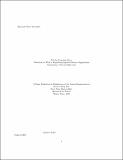| dc.contributor.advisor | Hutt, Peter Barton | en_US |
| dc.contributor.author | Bradt, Andrew | en_US |
| dc.date.accessioned | 2012-06-07T20:09:01Z | |
| dc.date.issued | 2005 | en_US |
| dc.identifier.citation | Not Its Crowning Glory: Obstacles for FDA in Regulating Ingested Dietary Supplements Purporting to Prevent Hair Loss (2005 Third Year Paper) | en |
| dc.identifier.uri | http://nrs.harvard.edu/urn-3:HUL.InstRepos:8852110 | |
| dc.description.abstract | Preventing hair loss is big business in the United States, amounting to over one billion dollars per year. While the industry is dominated by FDA-approved medications, like Propecia and Rogaine and hair transplant surgeries, there are also a variety of herbal remedies on the market with no proof of effectiveness. These products are allowed to exist and to claim to regrow hair or prevent future hair loss thanks to the provisions of the Dietary Supplement Health and Education Act of 1994, or DSHEA. This article examines how DSHEA allows these products to remain on the market, potentially defrauding millions of vulnerable Americans seeking to respond to baldness, and offers several possible solutions to the problem. | en |
| dc.language.iso | en_US | en |
| dash.license | LAA | en_US |
| dc.subject | Food and Drug Law | en |
| dc.subject | hair loss | en |
| dc.title | Not Its Crowning Glory: Obstacles for FDA in Regulating Ingested Dietary Supplements Purporting to Prevent Hair Loss | en |
| dc.type | Paper (for course/seminar/workshop) | en_US |
| dc.date.available | 2012-06-07T20:09:01Z | |
| dash.authorsordered | false | |
| dash.contributor.affiliated | Bradt, Andrew | |


